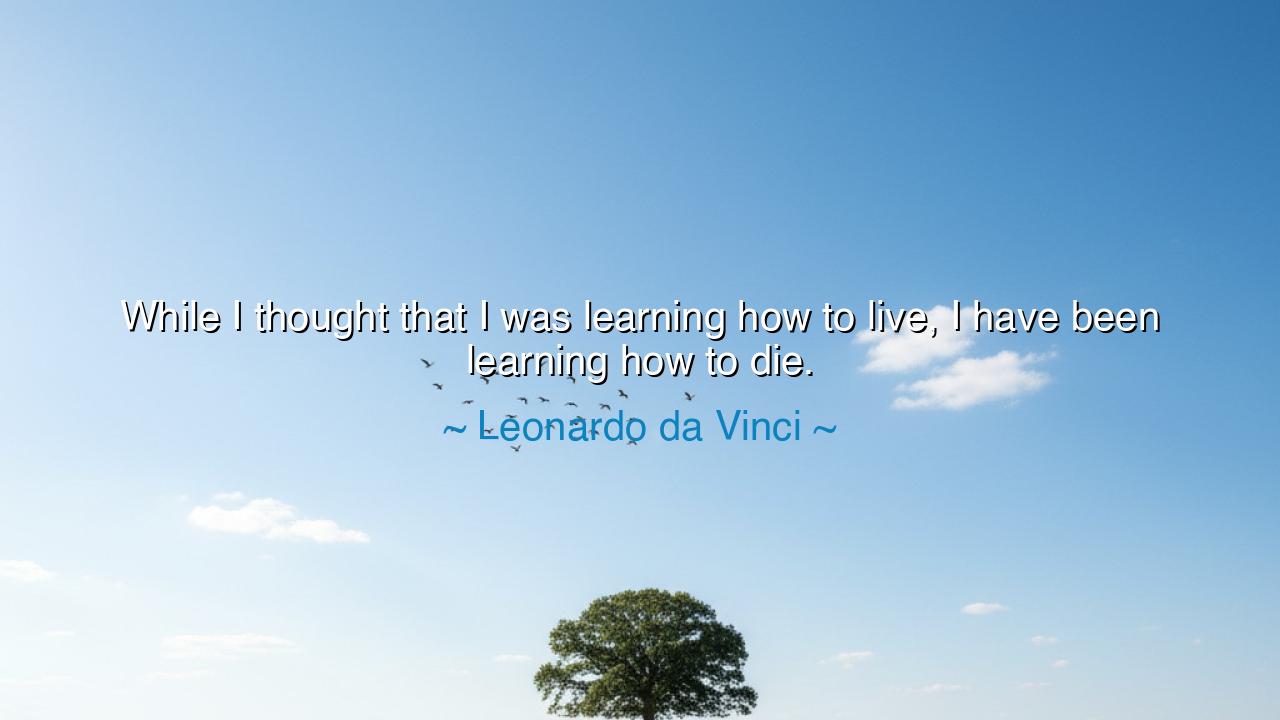
While I thought that I was learning how to live, I have been






“While I thought that I was learning how to live, I have been learning how to die.” Thus spoke Leonardo da Vinci, that luminous mind who gazed into the heart of creation and found within it both beauty and sorrow. In this single line, he confesses a revelation that few mortals dare to face—that life itself is a preparation for death, and that every lesson we gather beneath the sun teaches us, quietly, how to let go. For in learning how to live well—how to love, to create, to suffer, to forgive—we are, though we know it not, learning the art of dying well.
Leonardo, the artist, the scientist, the philosopher, lived a life of unquenchable curiosity. He studied the flight of birds, the flow of water, the structure of the human heart. To him, every act of observation was an act of reverence. Yet in the stillness of his later years, when his hands began to tremble and his eyes dimmed, he saw the truth that underlies all striving: that every discovery, every creation, every heartbeat, leads toward the same inevitable silence. To live deeply is to die daily—to surrender the past, to release what cannot be held, to allow each moment to pass as a breath returning to the infinite.
In the ancient world, such wisdom was not a cause for despair, but for serenity. The Stoics taught that to meditate on death is to free the mind from fear. Seneca wrote, “He who has learned how to die has unlearned how to be a slave.” For when death is no longer dreaded, life becomes radiant and unbound. Da Vinci, though born centuries later, understood this same truth. His quote does not mourn death—it honors it as the final teacher, the silent master that completes the lesson life begins.
Consider the story of Socrates, who, condemned to death by poison, spoke calmly of the soul’s journey beyond the flesh. His disciples wept, but he smiled, saying that the philosopher’s entire life is but a preparation for dying—an unlearning of illusion, a shedding of pride, a turning of the heart toward what is eternal. Socrates, like Leonardo, understood that every act of wisdom, every exercise of virtue, is a rehearsal for that final surrender. The one who lives mindfully dies with grace; the one who lives blindly dies in fear.
Leonardo’s words also carry a deeper, spiritual insight. In the act of creating art, he often felt the presence of something greater than himself—something divine, infinite, unreachable. Every painting, every design, was an attempt to capture that divine essence within the mortal frame of human hands. Yet he knew that perfection eluded him, that no brush could contain eternity. So he came to understand that life itself is not mastery but surrender. To live is to strive; to die is to release. And thus, the more he lived, the more he learned that true peace lies not in holding, but in letting go.
This is the paradox he reveals: that life and death are not opposites, but companions. Each day that passes is a small dying, each ending a rehearsal for the last. But in accepting this, we do not lose joy—we gain it. For when we recognize the brevity of our time, we awaken to the fullness of it. The morning sun becomes sacred, the voice of a friend becomes music, the beating of one’s own heart becomes a hymn of gratitude. To live with death in one’s awareness is to live fully awake, to cherish the fragile miracle of existence.
So what is the lesson for those who walk this path today? It is this: do not flee from the thought of death—invite it as your companion. Let it remind you that each moment matters. Do not waste your days in anger or regret, for they are the very fabric of your farewell. Create beauty while you can, speak truth while you breathe, love while your heart still answers. When you rise, let gratitude be your prayer; when you rest, let peace be your teacher. In this way, you will not fear the end—for you will have already learned its lesson through living.
And when at last the final evening descends and your breath softens into silence, may you, like Leonardo, smile with understanding. For you will know that you have not merely lived—you have learned how to die, and in so doing, you will have learned how to live eternally.






AAdministratorAdministrator
Welcome, honored guests. Please leave a comment, we will respond soon